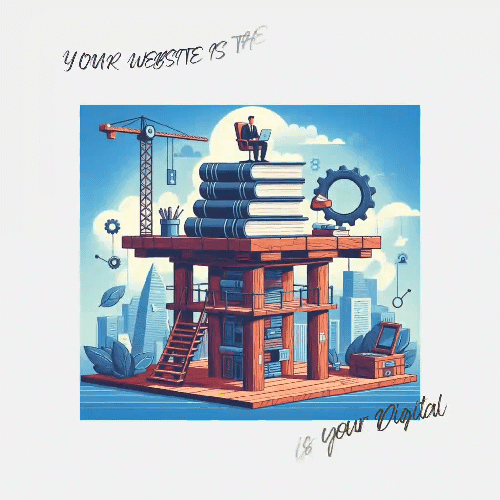
Write to Win: 12 Marketing Secrets for Authors in 2024
Whether you go the traditional publishing route or decide to self-publish, it requires a significant investment of time and money to do all the tasks necessary to create a book that sells well.
We have a lot of articles on writing here and soon we will launch our Author Academy courses about all things writing,so in this article, I’m going to assume you have written a book, and it’s a good one. Now the question is “How do I make it a best seller?”

However, if you think getting a traditional publisher solves your marketing problem, we have a few articles on that topic as well. But the short answer is, it’s not. If you are not a celebrity or established bestselling author, traditional publishers expect and require the author to do most of the heavy lifting for the promotion and marketing of their book(s). Even J. K. Rowling, who got a tiny advance for her first book in the Harry Potter series, found the book was going nowhere until she got stuck into the marketing herself.
In 2024, the competition is fiercer than ever, with countless books fighting for attention. That means, your great book is just another could have been bestseller that sits on the shelf until the bookshop returns it to the publisher for pulping. Unless someone gets behind it with an effective marketing campaign. “Someone” is a euphemism for you, the author.
Now the good news. Whether you’re a seasoned author or a debut novelist, learning the right marketing strategies can catapult your book from obscurity to the bestseller lists.
Welcome to “Write to Win: 12 Marketing Secrets for Authors in 2024,” where we uncover the most powerful and cutting-edge marketing strategies designed exclusively for authors this year.
You will discover how to harness the power of digital platforms, engage with readers in meaningful ways, and turn your writing endeavours into commercial triumphs.
Get ready to transform your approach and ensure your books not only reach the right audience, but make a lasting impact. It’s time to discover the marketing secrets that will define your success in 2024.

#1 Never Give Up
Van Dyke was a notable author, poet and clergyman, born in 1852. His quotation is a powerful reminder of the importance of determination in achieving success. I start with this because you are going to need a lot of determination to succeed as an author. If you have read our article, The Publishing Industry is Booming While Authors Are Going Broke ,you know many authors don’t succeed. But that is as much because of a failing of the system as it is to a lack of marketing skills by the author.
Marketing is not always immediately responsive to your strategy. Sometimes it takes time before you see results and sometimes it fails. That doesn’t mean you failed. It just means, do it better next time and if that doesn’t work, try another approach. But never give up. That’s determination.
#2 Don’t Be Just an Author – Be a Powerful Brand

Mahatma Gandhi said, “As a man changes his own nature, so does the attitude of the world change towards him.”
This is like my aphorism: To experience change, you must experience change. You must project success before you experience success. You must become the person you wish to become.
When someone writes their first book, they can legitimately claim the label; Author, and they will have the respect of those who know how much effort it takes to write a book. But there is a long road to travel between the label author and the honorific title of Bestselling Author.
Like any long journey, you will have options. If you’re not in a hurry, you can go the slow way and enjoy the view as you meander along. Sometimes, you’ll see road signs that kindle your curiosity and tempt you to follow them. Those road signs may take you somewhere interesting, but that route will not lead to your destination.
So after you have enjoyed your distraction, you must return to the road sign and continue on the way to your original destination. It’s a great way to travel when you are on holiday. I’ve done that many times. But in business or when you are trying to build a recognisable brand for yourself in a specific niche, if you take too long to reach your goal, you may discover that others have already reached it, making the opportunity less likely or at least less rewarding.
Why do people choose the slow way? Well, with personal development, it definitely isn’t to view the scenery. 😁 Half the travellers who go the slow route probably choose that way because they don’t know about the faster alternative. Those who know but choose not to go the slow route do so because they are not prepared to, or do not have the time to put in the effort that’s required, to reach their destination faster.
For those who want to know the fast way and for those who aspire to being an author one day, I’m going to give you an overview of what needs to be done to build your brand as an author. We have a more in-depth course coming soon and here is a link for a special Pre-order price that will go away when the course comes out.
Start Building Your Brand Early and Watch it Grow
My number one recommendation for people who haven’t started their first book yet is, start building your brand Now! For everyone else it’s, start building your brand Now! 😃 It is never too early to build your brand.
Brand building is like compound interest in a savings account. It grows slowly at first and gets much bigger over time. My math teacher in high school showed us a ridiculous example of this. He pulled out a chess board which has 64 squares. He said I’ll work for you for a whole month for 1 cent. And he put a cent on the first square. The next month you will double my pay, so he put 2 cents on the second square. The third month you will double it again, and pay me 4 cents, and he put 4 cents on the third square. Then he asked us to guess how much we would have to pay him when we get to the 64th square? None of us came close to the answer. Try working it out for yourself, but I will put the answer at the bottom of this section of the article as well.
#3 There is No Quick Fix to Brand Building

I’m sure you have looked at the answer to my compound interest conundrum, and now see why the earlier you start, the more fans you have when you need them. But It doesn’t happen overnight.
People often start using social media and give up when they see how slow the growth of their followers is. That is because they forget the power of compound growth. The key is to post content that people like to share. In this way, even if you only have two followers today, that could grow to millions in 5 or 6 years. To be honest, most people won’t get millions of followers, but they could easily get thousands or tens of thousands, and that is more than you need to be a bestselling author with every book you publish.
I believe an author’s brand is not a by-product of the books they’ve written; it’s a critical component of their success. Building a powerful brand creates loyal fans, which increases book sales, and opens doors to new opportunities. The alternative is to keep pumping out books and hope for the best. To me, that sounds like buying a ticket in the lottery. Someone wins, but the rest lose.
#4 How can you build a genuine connection with your readers
My advice is, take some time to think about what you want your brand to be? Who do you want as a reader and a fan? What are they looking for in their favourite author in your niche? Then ask yourself, “How can I build a genuine connection with my readers in 2024”.
Now let’s get to the meat and potatoes. I will outline the road map you should follow below:
#5 How to build and engage a community around your brand
First, define Your Brand Message. What are the core values and beliefs you want to present as an author? Make sure these are the central themes and underlying beliefs in your writing? Your branding efforts should reflect this because the essence of your brand goes beyond your written content. How you present yourself and how you engage with your fans will determine what kind of relationship you have with them and even what type of reader you attract. Attracting a mob that doesn’t buy books is of no value to you, even if there are thousands of them and they make you feel popular.
Develop a Signature Style. Your signature style distinguishes you from others. You express this through your book covers, website design, the tone of your social media posts, and the themes that you write about. It’s not one thing. It’s the entire package, including your idiosyncrasies. For example, if you like cooking, you may post recipes that your character’s like or if they are hiding in the wild, what do they forage to eat? Give your readers something they don’t expect, do it often enough, to keep them coming back for more.
#6 Create a Professional Website.

Your author platform is the foundation of your business. Every author needs one.
And while it could be a very simple platform (like a Facebook page), that’s not going to help you stand out in the crowd, or give your followers a unique experience.
A website is important to you because if readers cannot find you on the Internet or if you present poorly designed or unprofessional content, it will not reflect well on you as an author.
While social media sites technically count as an online platform, I don’t recommend you spend too much time building a page on a platform that is likely to change at a moment’s notice.
There’s a good reason an author’s website is the primary way to go. It will always have:
- A following no one can use, e.g. to send ads with other author recommendations.
- It’s totally your own place.
- It won’t be subject to the whims of Zuckerberg, Elon, etc.
- You can customise it to your heart’s content.
- Add email lists, landing pages, sell your books and a lot more.
In fact, this is the first platform that I recommend authors create. You need a place to call your digital home. One that you own and control.
However, a lot of authors, especially those just starting out, get overwhelmed when they try to set up a website. That’s why I recommend joining our Co-publishing programme, because we do all that for you. But another option is to hire a web developer rather than do a poor job yourself.
Summary. Your website is your online home base.
- It has a user-friendly layout, easy navigation, and prominently features your books.
- It can include quizzes, competitions, free downloads, and sell your derivative products.
- It has videos such as writer’s tips, book promo videos, Teasers and more.
- It has audio, for example, you reading a passage from your latest book or someone else, if that suits you better.
- It includes a section for your readers to access your podcast.
#7 Engage on Social Media. In 2024, authors will find social media and blog posts extremely valuable, as they allow them to connect with their fans more intimately. Authors should use these platforms to engage their readers by sharing behind-the-scenes content, chapters that didn’t make it into the book, book updates, and personal stories. Social media posts can link to blog posts with the full article, which drives more traffic to the website, to your podcast or your video channel and increases the rank of all of them in the search engines.
You can use platforms like TikTok, Instagram, and Facebook to showcase your brand’s personality. But when marketing on social media, I advise authors to pick a platform that makes sense for them.
My pick is probably Facebook. It has survived scandals in the past, so is likely to be around for a while and it’s a US company and that counts these days.
X is my bottom pick for authors in 2024 unless you write for a right wing audience. In my opinion, it’s not clear if X will still exist by the end of 2024, although Musk is a survivor, but it was always a challenge to sell books on the platform for most authors.
TikTok is a 50:50 bet as I write the content for this website because a majority of Americans see TikTok as a national security threat. But a majority also don’t support a TikTok ban. However, at the time of writing this article, both houses passed legislation which was recently signed by Biden, giving TikTok’s Chinese owners 270 days to sell it or face a ban in the US. Of course, they will appeal this legislation, but authors won’t want all or too many of their eggs in this basket.
The answer to my chess board question is $92,233,720,368,547,758. I can’t even pronounce that number. Please feel free to check it and if it is wrong, let me know.
#8 Create a Community: The New Frontier for Authors
In the ever-evolving landscape of literature and media, authors are no longer distant figures shrouded in mystery. The digital age has ushered in a new era where readers crave connection and community with the mind behind their favourite books. As we move through 2024, the relationship between authors and their audience is transforming, and the creation of a vibrant community is at the heart of this change.
#9 Fostering a Sense of Belonging
The foundation of any community is a sense of belonging. Authors can cultivate this by establishing platforms where readers can interact, share, and engage in discussions. Online forums, social media groups, memberships, courses, all of these are conduits for interactive interactions. Another activity that was popular before digital media arrived on the scene was live events but I don’t think they are as important these days. As an author’s reader base expands worldwide, it’s crucial to maintain a personal touch. Personalised responses, engaging in conversations, and acknowledging readers’ contributions make them feel valued and seen.
#10 Build a Strong Connection with your Reader
2024 marks a pivotal point for authors and digital media enables the author and, I would suggest, requires them to strengthen their direct connection with readers. Traditional barriers are dissolving, and authors need to think critically about their brand—not just as writers but as publishers and human beings. This involves having a strategic approach to self-promotion and an understanding that readers are not just consumers, they are now active participants in the journey.
#11 Personalised Content and Tailored Experiences
Although digital media has been around for a few years now, it is still quite new and developing in interesting ways. Something that is possible now but we will see it used a lot more in the future, in some very innovative ways, is the inclusion of tailored experiences which are interactive and therefore feel like personalised content.
Authors looking for ways to differentiate themselves from the crowd can now do so by offering personalised content and experiences. I’m referring to the idea of creating content that can adapt to different readers’ preferences or feedback. The key is to treat each reader as unique, providing them with a sense of ownership over their reading experience. Here are some examples:
- Interactive Storytelling: This is storytelling, where the narrative changes based on the reader’s choices. A popular example is the “Choose Your Own Adventure” book series. In these books, readers make decisions at key points in the story, and those decisions determine the story’s outcome.
- Augmented Reality (AR) and Virtual Reality (VR) Books: These technologies can provide immersive reading experiences. For example, an AR-enabled book might allow readers to interact with characters or settings using a smartphone or AR glasses.
- Reader Feedback: Some authors share drafts of their work with readers to gather feedback. This feedback can then shape the final version of the work.
- Personalised Learning Materials: In educational contexts, educators can tailor content to individual learning styles. For example, a textbook might include interactive quizzes that adapt to a student’s performance, offering more practice in weak areas.
- Subscription Services: Some authors offer subscription services where readers can receive new chapters or stories regularly. Authors could tailor these based on reader preferences or requests.
- Community Engagement: Authors can engage with their readers through social media, blogs, or forums. This allows them to understand their readers better and create content that resonates with their audience.
In all these ways, authors can make their readers feel unique and valued, enhancing their reading experience. We cover these ideas in more detail and much more in our soon to be released writing courses.
#12 Exciting Voices Verses Traditional Writing Styles
Digital media, such as the rise of personal experience You Tube videos, where everyday individuals share their experience, knowledge and views, is changing the way readers interact with content. Exciting and distinctive voices stand out. Look at how many teenage girls and young adults talk about how to use cosmetics, how to dress, how to cope with personal issues from bullying to parents and boyfriend issues. These were once the precinct of professionals and celebrities, but today, an 18-year-old schoolgirl can give advice to her fellow cohorts and they love it.
Authors should strive to inject personality into their writing, whether through humour, passion, or sincerity. Authenticity draws readers in and authors who can provide a fresh perspective or an engaging narrative voice will attract readers like Instagramer’s to a trending hashtag.
Conclusion
At Divya Publishing, we believe the role of the author and their publisher is no longer just to write and publish, but to connect, engage, and build a community. By fostering a sense of belonging, offering personalised content, and embracing the new publishing paradigm, authors can create a loyal reader base that truly feels more like a caring community than a fan club.
I am convinced, those who embrace the digital era, adapt to these advancements, and prioritise their community will establish themselves as leaders in the literary realm. I believe this applies to us at Divya Publishing just as much as it does to authors.





